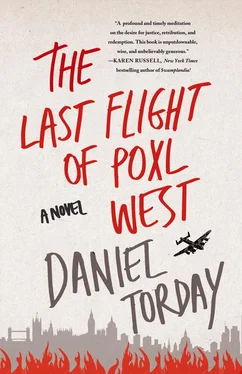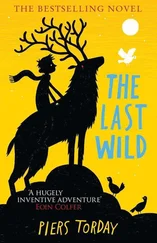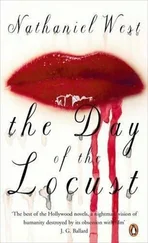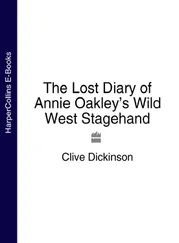“Like walking on a tightrope,” I said to Clive.
Sight serves as tyrant to the senses, a fact made so clear now that Clive had temporarily lost the use of his. Joseph Conrad, like me an East European displaced to Anglophone lands, said his job as a writer was “to render with the greatest accuracy possible the visible world.” I have always held an affinity for that idea. Our path was made arduous as we attempted to lead blind Clive about. When we set down, we all began to recognize our fatigue, but the adrenaline of the night was pumping still.
Next to Glynnis’s nose was a large cake of wood ash. I reached to wipe it off. She jerked back, but I put my other hand behind her neck and held her head steady.
“You might as well do the rest if you can,” she said.
The fabric keeping Clive’s eyes shut tight was not so sullied by the soot as to need to be removed, so I asked him if I could borrow it. Glynnis sat still as I dabbed at her face. With this revelation of her features there arose in me a feeling long forgotten, one that hadn’t been at the surface since the onset of the bombing in September. I looked at Glynnis’s clear flat skin, pores small and youthfully taut to shut out even the heavy black mud that covered her face.
There hadn’t been another siren for some time. The groans of downy sleep, death’s counterfeit, resounded through the crowded tunnel. Glynnis wiped away the remaining grime. She sat with Clive’s head cradled in her lap, lightly rubbing the area around his eyes. Would that it were my head in her lap. As I’ve come to know far too well, sometimes jealousy is the most sensitive detector of love. The rhythmic breath of the tunnel was canceled out by the adrenaline coursing through my veins. At the end of an hour, Clive opened his eyes.
“How is it,” I said.
“Bloody hurts.”
“Maybe you ought to keep them closed.”
He looked down to where Glynnis had her eyes closed. It was the first time he had properly seen her.
“Lovely,” Clive said.
“Isn’t she.”
“I can’t say I’ll want to stay down here much longer myself,” Glynnis said. She didn’t open her eyes. I tried to look away from her but found I couldn’t, and when my eyes returned to her they found what I’m certain was a smile on her face.
It was a good deal easier getting back out of the station than getting in, with Clive’s eyes returning to him enough for him to walk under his own power. A different kind of tempest was roiling above. Smoke had been driven off by the wind. We walked a couple blocks into a pocket of cooler air. Just then we heard the long high cry of the siren, another air raid, and ducked back into the Leicester Square station until the all clear came again.
It was the last of the night. The bombing had ended.
The only sound was the tympanic crackle of fires burning and the low bass of their more distant roar. It had begun to rain, a gentle spitting from the clouds — the red, bloodred, and orange clouds were still giving off light, as if the entire sky had become a nearby star, its swirling hot core just above St. Paul’s Cathedral — and I took off my helmet. What damage had occurred was for the most part done, and what people there were in those buildings were saved or not saved. We were near delirium, and it was only after walking for a half hour that Glynnis said, “Fleet Street once more. We’re walking in circles.”
We were all quite lucky to be alive. Next to St. Bride’s Church, down that little alleyway, the voices of firemen came loud and cheerful out of a pub whose windows had been blown out. At two o’clock in the morning, on this night that our whole city was in flames, this public house was open for business.
“Here comes another rope and tackle team,” a fireman seated near the front of the pub said. “Friend — pull three more.” The publican stood us round after round, and joined us. We discussed what we’d seen with these men from the fire brigade — they were eager to learn that we’d been in Gough Square, not far from where they’d been.
“Let us all drink a round to Samuel Johnson!” the first fireman called out. An old woman walked into the bar carrying a large bag. She walked up to the firemen behind us and pulled out three turkey sandwiches with thick wedges of rationed cheddar. The old woman looked as if there was nothing more in the world she would like to see than for them to eat her sandwiches, so they took and ate them without a moment’s hesitation.
Clive got up to buy us another much-needed round. While he was gone, Glynnis turned and not looking me in the eyes said, “Guy’s Hospital. That’s where I am if you want to call on me.” Her eyes met mine for just long enough. Then she said we had better join the crowd. Outside, the city was burning.
11.
“A life is made up of a great number of small incidents and a small number of great ones,” Roald Dahl, himself a former RAF pilot, once said. The period that followed the Blitz, those early days of 1941 into 1942, returns to me in the piecemeal memory of small incidents. Those early days during the Blitz, there were moments through the winter when we continued at our rescue work as squaddies and weeks when cloud cover was too thick for flight; nights with Clive at the pub and nights at home with Johana and Niny. Air raid sirens sounded and ack-acks fired and I rode my bike less and then more around London.
Glynnis dropped by to see me.
Clive came by to see me and then to see Niny, until soon he ceased looking for me as much and really only sought out my cousin, and during this period my thoughts of joining the Royal Air Force would be waylaid.
Glynnis needed my help. Her mother had taken ill. Glynnis had been raised in Knightsbridge. Her mother still maintained a home there, but in the early days of the Blitz she had traveled out of London to a town to the north and west of Stanhope, the Goldring family’s ancestral home. The Goldrings had lived in Kent since the late fourteenth century. They could trace their lineage to a vassal whose work on that land could still be seen in certain stone fences that wended deep into the deciduous forests native to that land. There was a famous story of a church deep in a wood where an imp had been carved into the cornerstone, an attempt to replicate something similar found in Lincolnshire. Glynnis felt pride that her forebears had been responsible for it. But none of that was the reason for Mrs. Goldring’s having absconded to Kent at the start of the air war, as I was soon to discover. Her mother was living in a cave she’d told me. I didn’t know even what to expect when we saw her.
We both secured weekend leave, and on a Saturday mid-March we found ourselves aboard a train east, staring off into the verdant hillsides of the area east of London. It bore the occasional mark of Luftwaffe attack. Every dozen miles we might see space in the far horizon where earth had been upturned, a brown gash in the grass. Sometimes there was water lying in the fields. Glynnis pointed out where a flock of brown geese had stopped to wet their feathers.
We stood by a window smoking. My arms and chest felt filled by some kind of acid in the first moments of this solitude — the anxiety that had underlain my thoughts all those days of falling Luftwaffe bombs now seeking exit. That reprieve was granted only in my looking at Glynnis’s face as standing water and swaying rushes passed outside our window. Tendrils of cigarette smoke surrounded her lovely plump face.
Not thirty miles later we detrained. The air was fecund and still and the distinct lack of carbonite in my nose felt a presence for its absence. Glynnis and I walked for what felt like an hour until the straw-thatched houses gave way to deciduous forest, maple leaves like palm fronds overhead. Soon the road took on steep declivities.
Читать дальше












